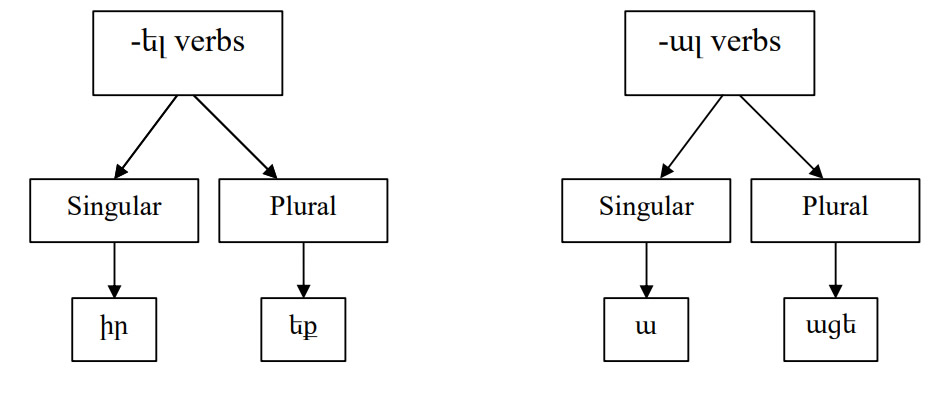Difference between revisions of "Language/Armenian/Grammar/Imperative-Mood"
(Created page with "thumb <div style="font-size:300%> Imperative Mood in Armenian</div> Imperative Mood The imperative mood is used to give commands....") |
|||
| Line 1: | Line 1: | ||
[[File:Armenian-Language-Polyglotclub.png|thumb]] | [[File:Armenian-Language-Polyglotclub.png|thumb]] | ||
<div style="font-size:300%> Imperative Mood in Armenian</div> | <div style="font-size:300%"> Imperative Mood in Armenian</div> | ||
Imperative Mood The imperative mood is used to give commands. Since the imperative is a direct command to someone it is either in the second person singular or second person plural. The imperative is formed by removing “-ել” and “-ալ” endings of verbs in infinitive and adding the endings իր, եք for “-ել” verbs and ա or ացեք for “-ալ” verbs. See the chart below. | Imperative Mood The imperative mood is used to give commands. Since the imperative is a direct command to someone it is either in the second person singular or second person plural. The imperative is formed by removing “-ել” and “-ալ” endings of verbs in infinitive and adding the endings իր, եք for “-ել” verbs and ա or ացեք for “-ալ” verbs. See the chart below. | ||
| Line 25: | Line 25: | ||
There are a number of irregular imperatives that do not follow this pattern. Below is a partial list of such verbs: | There are a number of irregular imperatives that do not follow this pattern. Below is a partial list of such verbs: | ||
{| class="wikitable" | |||
|Infinitive | |||
|Singular Imperative | |||
|Plural Imperative | |||
|- | |||
|լինել-to be | |||
|եղի՛ր | |||
|եղե՛ք | |||
|- | |||
|ասել-to say | |||
|ասա՛ | |||
|ասացե՛ք | |||
|- | |||
|տալ-to give | |||
|տու՛ր | |||
|տվե՛ք | |||
|- | |||
|անել-to do | |||
|արա՛ | |||
|արե՛ք | |||
|- | |||
|ուտել-to eat | |||
|կե՛ր | |||
|կերե՛ք | |||
|- | |||
|գալ-to come | |||
|արի՛, ե՛կ | |||
|եկե՛ք | |||
|- | |||
|տանել-to take to | |||
|տա՛ր | |||
|տարե՛ք | |||
|} | |||
| Line 36: | Line 68: | ||
The negative of the imperative mood is formed by the word “մի՛,” which is placed before the verb in the imperative mood. The word “մի՛” gets the stress sign: | The negative of the imperative mood is formed by the word “մի՛,” which is placed before the verb in the imperative mood. The word “մի՛” gets the stress sign: | ||
{| class="wikitable" | |||
|Մի՛ … | |||
|Don't … | |||
|- | |||
|աղմկիր | |||
|be noisy | |||
|- | |||
|լացիր | |||
|cry | |||
|- | |||
|ծիծաղիր | |||
|laugh | |||
|- | |||
|ստիր | |||
|lie | |||
|- | |||
|պատմիր | |||
|tell | |||
|} | |||
1) Թարգմանի՛ր այս տեքստը: Translate this text. | 1) Թարգմանի՛ր այս տեքստը: Translate this text. | ||
Revision as of 23:09, 24 September 2021
Imperative Mood The imperative mood is used to give commands. Since the imperative is a direct command to someone it is either in the second person singular or second person plural. The imperative is formed by removing “-ել” and “-ալ” endings of verbs in infinitive and adding the endings իր, եք for “-ել” verbs and ա or ացեք for “-ալ” verbs. See the chart below.
The table below gives the imperative forms of “listen” and “read.” The last vowel of the word in imperative gets a stress sign “ ՛.”
1) Լսի՛ր քո մորը: Listen to your mother.
2) Լսե՛ք ձեր ուսուցչին: Listen (all of you) to your teacher
3) Կարդա՛ նախադասությունը: Read the sentence.
4) Կարդացե՛ք լավ գրքեր։ Read (all of you) good books.
There are a number of irregular imperatives that do not follow this pattern. Below is a partial list of such verbs:
| Infinitive | Singular Imperative | Plural Imperative |
| լինել-to be | եղի՛ր | եղե՛ք |
| ասել-to say | ասա՛ | ասացե՛ք |
| տալ-to give | տու՛ր | տվե՛ք |
| անել-to do | արա՛ | արե՛ք |
| ուտել-to eat | կե՛ր | կերե՛ք |
| գալ-to come | արի՛, ե՛կ | եկե՛ք |
| տանել-to take to | տա՛ր | տարե՛ք |
1) Քո բաժինը կե՛ր և ափսեդ լվա՛։ Eat your share and wash your plate.
2) Հիմա կերե՛ք, հետո գնացե՛ք և քնե՛ք։ Now (all of you) eat, then go and sleep!
The negative of the imperative mood is formed by the word “մի՛,” which is placed before the verb in the imperative mood. The word “մի՛” gets the stress sign:
| Մի՛ … | Don't … |
| աղմկիր | be noisy |
| լացիր | cry |
| ծիծաղիր | laugh |
| ստիր | lie |
| պատմիր | tell |
1) Թարգմանի՛ր այս տեքստը: Translate this text.
2) Մի՛ թարգմանիր այս տեքստը: Don't translate this text.
In spoken Armenian you will often hear the “ր” dropped from the end of the singular imperative.
In Armenian the infinitive may function as a command especially an official and authoritative command.
1) Հանցագործին գտնել և պատժել։ Find the criminal and punish her/him!
2) Դուռը փակել։ Close the door!
3) Պահպանել լռություն։ Keep silence! 4) Չծխել։ No Smoking
Sources
https://slaviccenters.duke.edu/sites/slaviccenters.duke.edu/files/handbook_of_armenian.pdf


